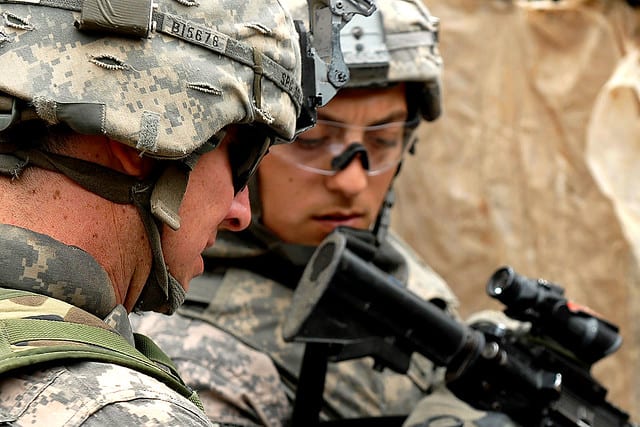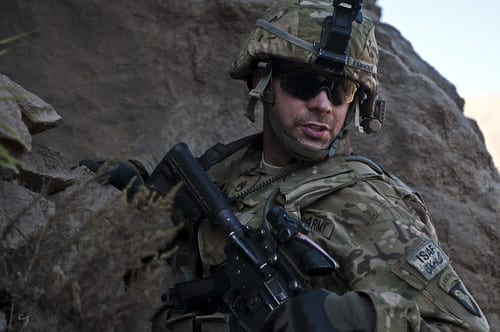The following excerpts come from Beyond Trauma by Dean Bonura.
…
Distinguishing Guilt and Shame
Guilt and shame are frequently associated with trauma, and particularly with the onset of PTS. They represent major theological themes in Scripture. Guilt is often at the core of much human suffering and is a crucial factor in many problems people face.2
While guilt conveys a sense of responsibility or fault, shame has more to do with a sense of worthlessness. Guilt is about the failure to act or about acting inappropriately. Shame is about feeling bad because that is the way one perceives oneself.3
 In The Road Back, Ernst returns home to learn that his friend Albert has suffered terribly from the war. He has lost both of his feet. While there is nothing Ernst can do about it, the sight of his friend makes him feel ashamed and guilty. He cannot help but feel that he is to blame because he has his feet and Albert does not. This narrative illustrates how guilt is often linked to shame.
In The Road Back, Ernst returns home to learn that his friend Albert has suffered terribly from the war. He has lost both of his feet. While there is nothing Ernst can do about it, the sight of his friend makes him feel ashamed and guilty. He cannot help but feel that he is to blame because he has his feet and Albert does not. This narrative illustrates how guilt is often linked to shame.
The same is true with the soccer player in the movie Bella. The soccer player, José, feels guilty because he was responsible for the accident. He feels shame because he caused the death of a child by his carelessness. He is ashamed because he believes his life has become worthless; no matter what he does, he cannot redeem himself.
The focus of guilt is on conduct. Shame runs much deeper and has to do with character, which is more difficult to change.4 Shame is a consequence of wrongdoing, but not all people who feel shame are guilty of wrongdoing. Shame, like guilt, may be false when the feeling is based on false premises or misperceived wrongdoing. This was the case with Ernst. He had nothing to do with the loss of Albert’s feet.
Guilt and shame may be indicators of a violated standard or a perceived violation. Caregivers must take the time to discover which one it is. Many servicemembers are blaming themselves for things they never did. Guilt and shame are essentially relational concepts, but guilt has a judicial aspect as well.5
Categories of Guilt
There are basically two categories of guilt: objective guilt and subjective guilt.6 Objective guilt has to do with the violation of a standard, whether legal, biblical, moral, personal, or societal. People can be objectively guilty regardless of how they feel.
Subjective guilt has to do with feelings. Feelings of guilt vary widely depending upon the standard that was violated. A violation of a personal standard, such as missing an exercise routine, is quite different from a violation of a legal or societal standard, such as robbing a bank. In every case of perceived guilt, counselors need to consider the subjective aspects of the guilt in relation to the violated standard.
Something may be legally acceptable but morally or ethically wrong. In this case, there is objective guilt based on a violation of a moral or ethical standard. Given the shifting values and standards of society, guilt is increasingly becoming a relative issue. Regardless, feelings of guilt are real and they must be addressed.
Subjective guilt is based entirely on feelings and personal perceptions of a violated standard. These perceptions may not always be accurate. So when considering aspects of guilt, both subjective and objective guilt must be examined.
…
Shame and PTSD
The dehumanizing effects of war are well documented in many personal accounts. Such dehumanization, cultivated by desensitization to killing, only contributes to the veteran’s grief, guilt, and sense of shame later.
 Dehumanization is pervasive and attacks our humanness like a cancer. It can taint the deepest recesses of the soul. The carnage of war muddles the soul’s appreciation for grace and beauty, and may distort one’s ability to perceive God’s grace, love, and mercy.18 Many veterans are hammered by shame and guilt or held captive by war’s dehumanizing spell; it is a bewitching that leads many to moral ruin.19
Dehumanization is pervasive and attacks our humanness like a cancer. It can taint the deepest recesses of the soul. The carnage of war muddles the soul’s appreciation for grace and beauty, and may distort one’s ability to perceive God’s grace, love, and mercy.18 Many veterans are hammered by shame and guilt or held captive by war’s dehumanizing spell; it is a bewitching that leads many to moral ruin.19
Shame is often more pronounced in veterans who suffer with PTSD. In a study on shame and its contribution to PTSD, hospitalized veterans diagnosed with PTSD were administered several assessment instruments measuring shame, depression, and self-esteem. Their scores were compared to another group of hospitalized veterans with depression and substance abuse. The results showed that veterans suffering with PTSD scored higher on their internalization of shame and depression than those without PTSD.20
…
These excerpts pulled from Beyond Trauma by Dean Bonura.
2. Collins, Christian Counseling.
3. Schiraldi, The Post-Traumatic Stress.
4. Ibid.
5. A. J. F. Dulley, “Guilt,” in Baker’s Dictionary of Christian Ethics, ed. Carl F. H. Henry (Grand Rapids, MI: Baker Book House, 1981), 279–280.
6. Collins, Christian Counseling.
18. Gray, The Warriors; Tick, War and the Soul; Shay, Achilles in Vietnam; Grossman, On Combat.
19. Tick, War and the Soul.
20. M. R. Wong and D. Cook, Shame and Its Contribution to PTSD, accessed February 12, 2013, DOI: 10.1002/jts.2490050405/abstract.
Photos: Operation ‘Bull Chisel’ by the U.S. Army. Licensed under CC BY 2.0.
Cave search by the U.S. Army. Licensed under CC BY 2.0.






